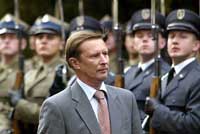Russia warns Kosovo independence could spark 'chain reaction' among separatist regions
Russian Defense Minister Sergei Ivanov issued a strong warning Friday that granting independence to Kosovo could spark a "chain reaction" among other breakaway regions in Europe and the former Soviet Union.

Ivanov spoke before holding planned talks with his NATO counterparts, who have backed a plan drawn up by U.N. envoy Martti Ahtisaari proposing internationally supervised statehood for the separatist Serbian province.
Russia has long expressed reservations about Kosovo's separatist aspirations, and Ivanov's comments underscored differences between Russia and the West. The issue of Kosovo's status will be discussed next month at the U.N. Security Council.
"If we imagine a situation where Kosovo achieves independence, then other people, people living in regions that are not recognized, will ask us: "Are we not as good as them?" Ivanov told reporters.
"This concerns obviously the post-Soviet space, but also regions in Europe," he said. "This can create a chain reaction ... we must be careful not to open Pandora's box."
In a later news conference, Ivanov also raised a number of issues showing differences with the Western allies including U.S. plans to station missile defense facilities in central Europe and long running disputes over a Russian base in Moldova and the failure of NATO nations to ratify a conventional-arms limitation treaty.
U.S. Defense Secretary Robert Gates repeated U.S. reassurances over the proposed missile installations.
"There's clearly no danger to Russia," he said.
However Ivanov dismissed U.S. assurances that the installations would be meant to deal with a potential threat from Iran or North Korea.
"Look at the map," he said. "Any expert can prove the fact that the trajectory of missiles (from Iran or North Korea) will be very far from Poland and the Czech Republic."
He repeated warnings that Russia would develop a "strategic system" that would surpass any anti-missile system, but insisted Moscow would not get drawn into a new arms race with the U.S.
Ivanov stressed Russia's willingness to help NATO's military in Afghanistan including by reviewing Afghanistan's US$10 billion (EUR7.7 billion) debt to Russia. But he acknowledged a five-year cooperation agreement between the former Cold War foes was not making much progress.
"We have reached a plateau, we are a bit stuck," he said. Ivanov, tipped as a possible successor to President Vladimir Putin, proposed a Russia-NATO meeting in June in St. Petersburg to plot closer cooperation over the next decade.
NATO Secretary General Jaap de Hoop Scheffer restated Western support for Ahtisaari's recommendations on Kosovo, after Slovak President Ivan Gasparovic broke ranks with the alliance by criticizing the U.N. envoy's report as unfavorable to the Serbs and called for postponement of a final settlement.
"There is full support for President Ahtisaari's proposals and there is support for the timelines," de Hoop Scheffer said. "The position as far as the allies are concerned has not changed."
Moscow has often warned that Kosovo's status will serve as precedent for other nations with similar cases, including several breakaway provinces in the ex-Soviet Union. The Kremlin has hinted that, were Kosovo to gain independence, two pro-Russian rebel regions in Georgia and a breakaway province in Moldova, which enjoy Moscow's tacit support, could follow suit, reports AP.
Serbian officials also have warned that an independent Kosovo could also serve as a precedent for independence movements elsewhere, notably in Spain's Basque Country or Catalonia.
Kosovo has been under U.N. and NATO administration since a 78-day NATO-led air war that halted a Serb crackdown on ethnic Albanian separatists in 1999.
Ethnic Albanians, who make up 90 percent of Kosovo's 2 million people, are seeking independence from Belgrade. But Serbia and Kosovo's Serb minority say the province is the heart of Serbia's ancient homeland and should remain within its borders.
Subscribe to Pravda.Ru Telegram channel, Facebook, RSS!




